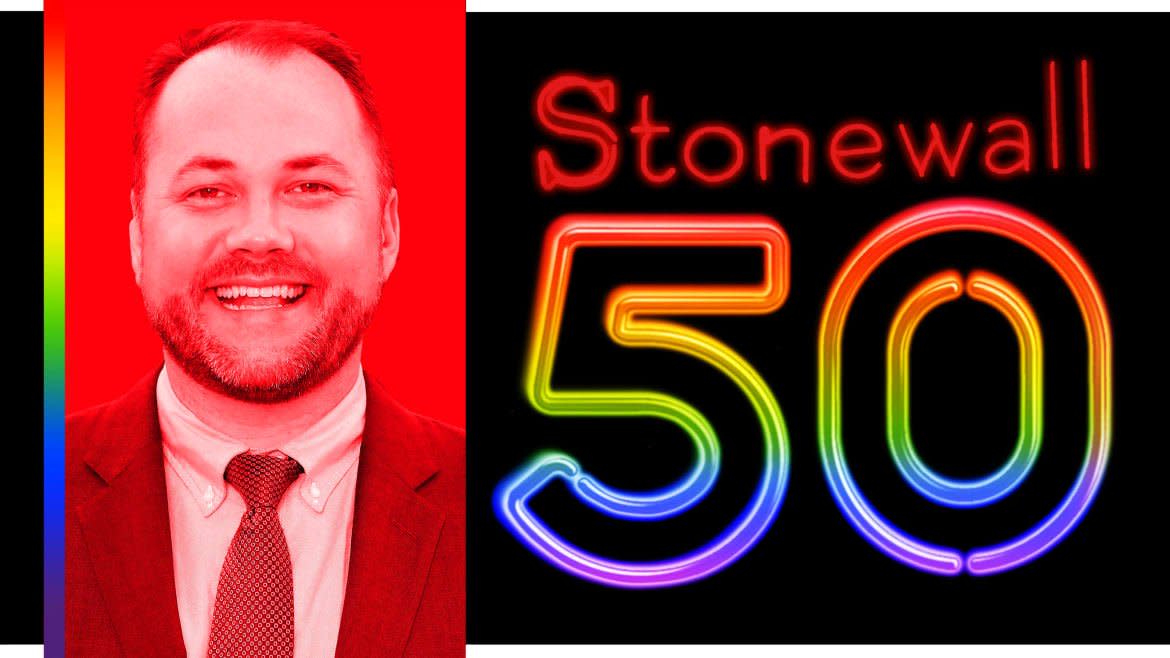Corey Johnson: ‘Stonewall Feels Very Personal. It Had Such an Incalculable Impact on My Entire Life.’

In this special series, LGBT celebrities and public figures talk to Tim Teeman about the Stonewall Riots and their legacy—see more here.
Corey Johnson is speaker of New York City Council, the first out-gay man to hold the position. Johnson is the only HIV positive elected official in New York and would be the first openly gay mayor of New York City if he runs and is elected in 2021.
When and how did you first hear about the Stonewall Riots?
I can’t put my finger on the exact moment. I came out in a small town of about 3,000 people about 30 miles north of Boston when I was 16 years old in 1999.
When I came out I was the only openly gay student out of 1,000 kids in my high school. I remember looking to devour any books I could get my hands on, and any information on the internet to understand the history of LGBT people. In the course of that I remember finding a bunch of books. Those included Charles Kaiser’s The Gay Metropolis and Out For Good: The Struggle To Build a Gay Rights Movement in America by Dudley Clendinen and Adam Nagourney.
I learned about Stonewall on my first trip to New York City in 2000. I had just turned 18, and the first place I wanted to go was Christopher Street and lay my own eyes on the Stonewall and stand in the spot which ignited the flame for the modern LGBT civil rights movement in America, and some would say across the world.
I felt very drawn to it, and connected to it, from an early age as soon as soon as it entered my consciousness. This was before smart phones. I stood outside, and had someone take my photo with a disposable camera I had bought just to mark that moment. I wasn’t old enough to enter the bar.
What are the significance of the Stonewall Riots for you now?
I am one of five openly LGBT members of New York City Council out of 51 and am the Speaker of the body and the only openly HIV-positive official in the state of New York.
For me, none of that would be possible—coming out at 16, coming to New York City at 19, running for office at 30, being Speaker at 35—without the activists, advocates and allies who stood up that night in 1969 and said, “Enough is enough. We’re sick of being oppressed and marginalized and discriminated against.”
That laid out the groundwork for me to come out the closet as a teenager and 20 years after that become Speaker of the municipal legislature in the largest city in America. The Stonewall Riots feel very personal for me. I feel very moved by them. They had such an incalculable impact on my entire life.
It’s a hallowed, historic place that people want to be at moments of pain and celebration. It has such enormous symbolism, it’s hard to even put into words a place that draws people like that.
How far have LGBT people come since 1969?
We’ve come an enormous, enormous way. It’s now not illegal to be gay in the United States of America. Marriage equality exists. Gay people are accepted in most places. But a level of cognitive dissonance exists.
Even though we’ve come so far, the last two years with a hostile federal government and hostile state governments around the country have shown the battle for full civil rights and acceptance is an ongoing battle which is not going to end anytime soon. There is an epidemic of violence against LGBTQ people, especially trans women of color. Familiar rejection still exists for LGBTQ youth.
Even though we have made enormous strides, there is a lot of work left to do to achieve full equality and acceptance. The trans military ban shows that we take two steps forward and sometimes two or three steps back.
It’s normal for human beings to feel anxious when under attack. But I think the history of LGBT people—whether a special night in 1969, or when ACT UP was founded, or when we have seen activism in states and cities across the country at key moments for LGBT civil rights—is a history of fighting and activism, and coming out and putting our minds and bodies on the line to achieve full equality.
I hope that anxiety and worry translate into activism. My hope is to stand on the shoulders of activists like Bayard Rustin, Audre Lorde, Marsha P. Johnson, Sylvia Rivera, Harvey Milk, and all the folks who came before them living in even more precarious times than we are now. Somehow they mustered the spirit to fight for themselves and fight for us. We are the ones who see the dividends of those fights now.
What would you like to see, LGBT-wise, in the next 50 years?
I would like for every LGBT person to live loudly, honestly, flamboyantly, in whatever way that suits who they are, without fear of violence, discrimination, rejection, and for all LGBT people of all races and gender identities to be able to live their lives without fear of violence, harassment, and rejection. That’s the world we strive for and that’s the work we have to do every single day to make sure it’s possible.
Got a tip? Send it to The Daily Beast here
Get our top stories in your inbox every day. Sign up now!
Daily Beast Membership: Beast Inside goes deeper on the stories that matter to you. Learn more.

